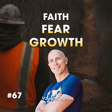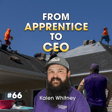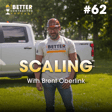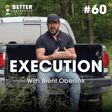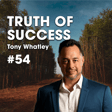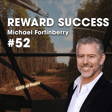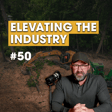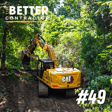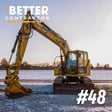Introduction and Focus on Scaling Businesses
00:00:14
Speaker
right welcome back to another edition of the better contractor podcast today i am joined by josh elatus with 616 solutions limited he is someone that we use a little bit in house um You guys know that we always preach systems and processes, building stuff out, starting that way up front instead of waiting to catch up later.
00:00:34
Speaker
So excited to have Josh on. Again, this is one of those that kind of practice what you preach. We're in the process of doing some of this as we speak, changing from an older system to a little bit, hopefully a better newer one that can grow with us as we continue to scale. So excited to have Josh on. Josh, welcome.
00:00:50
Speaker
Hey, thanks for having me, Brent. Yeah. Absolutely, man. Tell me a little bit about your background.
Josh's Background and Importance of Systems
00:00:55
Speaker
I know you had some like engineering background, if I recall. Yeah. So in school, I studied industrial engineering and everything about that is about processes. They gear you up for really working in a factory or assembly line or so something like that is the typical industrial engineering.
00:01:10
Speaker
And then I ended up finding myself in business software. and working on dashboards, databases, things like that. And then I realized, wait a minute, all of this connects. This is just another form of process, even though it's not a physical making something in the factory setting.
00:01:27
Speaker
We're just the same type of systems, the same type of processes still apply here. And so that's what our background has been looking at the process of the business, looking at that in the same way we look at a factory, the same way we look at making something and then figure out how do we make that more effective? How do we make that more efficient and standard?
00:01:45
Speaker
Okay. One of the questions I did have kind of right off the bat is kind of your thought on, so we talked about before the podcast, this is kind of a contractor podcast.
Common Mistakes in Setting Up Systems
00:01:54
Speaker
Yeah. Obviously that's entrepreneurial in nature, which can apply to any industry, but what is something that you think a lot of young entrepreneurs, beginning entrepreneurs, maybe people in that five years and under, what are mistakes you think they make when it comes to these systems, these processes developing and using a software?
00:02:11
Speaker
Well, the thing that I've seen so many times, and I've even, when I was starting my company, made the exact same mistake where it's thinking, oh, we do X, Y, and Z. And I do that really well.
00:02:21
Speaker
And so now I just need to do more of that. When in reality, there's a limit to how much I can do of that. So I need to train someone else to do that. So I train someone else, I make it happen. and then I train somebody else and then I leave that first person alone and they start doing things and whatever they start doing, I think in my mind, it's how I train them as the entrepreneur, as that first contractor, the guy that's starting things.
00:02:42
Speaker
And then about six months into it, I look back at what they're doing and I'm like, this isn't what we talked about at all. What are you doing? And they're like, well, you told me to do it how I thought best. And this is how I thought best.
00:02:53
Speaker
And some of those things actually they had brilliant ideas and some of those things were big gaps in quality that it just wasn't going to work. And so thinking that I'm different than everybody else when it comes to systems and processes because I'm small, I'm agile, we adjust as we go, we're creative, we don't have rules, um that that very flexible mindset, which is it's important to have that.
Intentional Systems vs. Ad Hoc Systems
00:03:16
Speaker
But the reality is every big company, every company that grows, every company that starts as one person in a garage and ends up with more than one person in a garage has to have actual processes in place.
00:03:29
Speaker
And that's the biggest thing that I've seen is that people just throw systems in place. They've got an Excel sheet for this. They've got a QuickBooks for that. But they don't think about where they're going end up. And a quote that I really love is, everyone ends up somewhere, but few people end up somewhere on purpose.
00:03:45
Speaker
And that's one of the most amazing things when it comes to systems, because most people just end up with whatever systems that, hey, Bob in accounting thought this would be good for that. This dude out in the field was trying to receive something in. So he just created a spreadsheet to track it.
00:03:58
Speaker
And now my data and my processes are in all these different places. None of them talk. And what you find about a year and a half into whatever it is you're doing, especially as you're adding more people, is I am spending more time trying to hunt down the right information than I'm actually spending doing what I'm in business to do.
00:04:15
Speaker
And I have no idea how much time I'm wasting. And the reality when we come in there and we start analyzing this is, okay, you would be 50% more efficient and you'd actually be able to do more sales, more projects of whatever it is that you're in business to do.
00:04:31
Speaker
If you actually got systems that talked and were intentional with it rather than just wherever you end up, you choose, Hey, I want to be here. I want to be proactive about this. No, that's perfect. And you actually hit on one of our pain points, which is we, over so we're in a little bit of a niche industry, meaning we're not, we're like in tree care, but it's not tree care.
00:04:51
Speaker
We're in pipeline maintenance, but it's so unique that there's not like this perfect in a box system that says, here, here, use this as is.
Integrating Systems with Odoo
00:05:01
Speaker
So we reached out to Odoo, which is an open ERP, and we're using Josh here at 616 Solutions with our own internal team.
00:05:08
Speaker
But the reason we really went down this route is we had a whole bunch of little systems that we were trying to make all talk to each other to get the product that we wanted. And that's not like, it it's like you just said, that's not efficient whatsoever.
00:05:21
Speaker
So that's why we decided to kind of go down this route. But what started that in my head is that when we got ready to do some bidding, so our bids are always bored. Some are like, Hey, let's do a lump sum. Let's do a per mile. Let's do, there's all these different ones depending customer, how they want their bid sent.
00:05:39
Speaker
But it's like, I need to go back through and look at all these KPIs, this data, all these other things. And I realized because of how those systems were talking to each other, not as efficiently as they should be. It's like, shoot, I don't have enough of that information. I have a little bit, but I need more of it. I need to make 100% sure it's correct and it's accurate.
00:05:57
Speaker
But anyway, to to expand on that a little bit more, i think the value for an entrepreneur or a CEO or a business owner with having good systems is being able to have your thumbprint on pulse of the business at all times.
00:06:10
Speaker
So what are your KPIs? Are they doing well? Can you look at a dashboard and immediately have access to how that's trending over a month, ah a year? I think so many young entrepreneurs do not value that enough. They don't take the time to actually go in and look at that dashboard and say, Hey, I need this number to be here. I need this percentage, this ratio, this financial deal, whatever I need it be right here.
00:06:33
Speaker
And we're actually trending the other direction. So in that moment, the importance of the dashboard and the systems is that you can actually kind of see that go the opposite direction in real time and hopefully fix it and correct course before it's too late.
00:06:44
Speaker
Is that something you guys deal with a lot with other with other customers?
Monitoring KPIs and Business Management
00:06:47
Speaker
Oh, 100%. Yeah. And what I would say one of the biggest things is, again, customers tend to be reactive when it comes to their systems, when it comes to their KPIs.
00:06:56
Speaker
And so only when it's bad enough that they should care about looking at it, do they start looking at it. And the reality is, A lot of times it's because you grew up with a system when you were first starting off that was so all over the place, it took you 10 minutes to get into your bank account to figure how much was in there.
00:07:11
Speaker
It took you another 15 minutes to try to find the report and to do the breakdown on, okay, what projects are we quoting? What are we quoting them at? And then you had to call the other guy to figure out, okay, where is the operations team out there in the field?
00:07:24
Speaker
And what did they actually get done today? So you just, at that point, your mindset is just trained. I only look at things when there's big problems because then it's worth logging in there. And what we want our customers to do is we have dashboards for them that just tell them all of that information in one place.
00:07:41
Speaker
And what we struggle with sometimes, even on top of that, when you have the right dashboards is getting the executive team to be like, okay, every day you should have a habit. I look at this metric. I look at this metric. I look at this metric. And if nothing changes in it, I'm glad I looked at it and know that nothing changed in it.
00:07:57
Speaker
And I think that's one of the the hard things about the the busy contractor, the busy person that's trying to lead, cast vision and run operations and keep control of quality is they don't want to sit down and spend that 15 minutes when they've got their systems together and look at the systems they've put in place. And I think that's very important.
00:08:15
Speaker
from the contractor side, especially as the person starting this, is that you need to have your pulse every single day. Even if you're going to talk to the guys or not, you know where it is. And that's why I love the what you just said about the pulse, because a pulse is something that's constantly happening. It goes up and it goes down, but you can check it when you want to.
00:08:34
Speaker
And having a regular set method of, I'm going to check it every morning when I wake up at 8.15, this is my time after I've done all my whatever it is, I'm going to check the business KPIs that are important to me.
00:08:45
Speaker
And I don't think most executives or contractors are thinking that proactively so that instead it's just reactive. Hey, uh-oh, my accounting guy says we have no money in the bank rather than, oh I know that these things are outstanding and I know this is how much we have in the bank. I see in next week we're going to have a problem.
00:09:03
Speaker
Yeah, yeah, no, that's perfect. I like that
Efficient Task Management Strategies
00:09:05
Speaker
too. And that brings up a good point to share the podcast is as you know, the listeners are growing their businesses, whatever, And I've noticed with myself, even in the last maybe five years, I've decided to start breaking up my day in chunks. So like little two hour, one hour, four hour chunks.
00:09:21
Speaker
And each day of the week, I will make sure I do a certain thing. So like for me, I now try to reply to emails during a certain block of time because emails take up so much. Like it interrupts you if you try to just do it all day long and just kind of keep up with it.
00:09:35
Speaker
It's a constant interruption, just like social media almost. So I'll block out specific times to just do that. So I can focus on something else those other times. But what you bring up is a good point of making time. Maybe it's just 15 minutes.
00:09:48
Speaker
The first thing you do every day is you get on, you look at your dashboard, do that. um Usually ask podcast guests to not do a plug, but I'm going have you do one oh wow because I think it'll be helpful. So the reason I say not to do plugs is because I don't want people to think this is a selling podcast. I want to strictly be helpful.
00:10:08
Speaker
I think in this case it might be helpful. So walk me through a little bit what you guys can do because I'm putting myself in the listeners shoes.
Odoo's Affordability and Scalability
00:10:16
Speaker
And if I do that, I'm thinking maybe I'm a listener and I have one to five employees, we're brand new.
00:10:22
Speaker
Does Josh have a solution for me? Or maybe I'm like Lanarkorp, I'm a medium sized company, 50 to 100 employees, and I've been doing something that is working, but I think it could be better How can Josh help me? So can you tell me just a little bit about the solutions that you think some of our listeners may have pain points with?
00:10:42
Speaker
Yeah. So I would like to just step back and tell the story of how I got into this, because the reality is I didn't start with Odoo. I started, again, as an industrial engineer, a big client that had a lot of employees, multi-company, multi-country. They were operating out of And the CEO said to me, I feel like i have I'm a pilot and I have no gauges, no instruments, no visibility in what's happening.
00:11:06
Speaker
So we're like, okay, let's try to get his stuff together. And they were using Microsoft Dynamics. And Dynamics is like the battleship of these kinds of software systems. But what's cool is it plugs into Microsoft Power Automate, Power BI, all the Microsoft systems.
00:11:21
Speaker
So I can make automations that like, hey, this workflow happens every day. Every time someone clicks this, it automatically sends these emails to these people and we automate it and we can track it and we can get visualizations and see all that stuff.
00:11:32
Speaker
So we were working in Dynamics. We were making all these automations. And I thought, like, this is the greatest thing ever. This guy has visibility. We're automating processes. And then I was talking to the director of IT.
00:11:43
Speaker
and we were looking at what he's paying in licensing and you're looking at like 80 to $150 per user per month. And I was like, this is the coolest thing ever, but it just costs so much money that the guy starting out there, that's not going to help them.
00:11:59
Speaker
The guy that's even in that mid range that you're talking about with Lander Corp, like this is overkill. You're buying a battleship and you need something that's agile, something that you can edit with these automations and low code, no code.
00:12:10
Speaker
But it just isn't there. And so the reality is I got into Odoo because I was working with one of my clients and they were trying to figure out the best system. And I was like, well, I know the big guys, but that's not helpful for you. And I want to find what's actually helpful for someone that it was a startup in this case, a tech startup. And I was like, I want something that is.
00:12:28
Speaker
And I came across Odoo and what amazed me about it was it's been around for 20 years. So it's a mature product. A lot of these softwares, they try to sell you on something they just developed in the last few years.
00:12:40
Speaker
But the reality is you're the one that's testing it out. You're going to find all these problems. So many softwares that we've switched our customers off of have been these things like, oh, they sold us on this, but then they told us that is going to come out three years from now.
00:12:53
Speaker
The reality is of why I love Odoo. It's a mature software. It's been around the rest of the world for years. They're just getting into the US market, but they work for a one person company. And then they also have some of the largest accounting firms, some of the largest manufacturing companies in the world.
00:13:08
Speaker
they use Odoo. So it scales amazingly. And what their shtick is, is they charge you per user. So their goal is, I want to get you to start off as the one person contractor, and I give you all of the tools you need. So instead of charging you like Microsoft does, where they charge you, hey, you want to use accounting?
00:13:24
Speaker
That's going to be this much. Hey, you want to use the dashboards? That's going to be another this much. Hey, you want to make automation? That's going another. What's amazing about the software and why we chose Odoo is to be a partner with is that everything, you get everything out of the box day one. If it's just you and you're a one person contractor, you're a plumber, you're whatever you're doing, you get a free website built in the system. You're not paying for hosting.
00:13:45
Speaker
You get a free system to quote for your customers. You get a free CRM. to implement and it creates sales orders. You can have your customers pay online and send them those messages. It creates a field service thing. All of the apps and functionality that Odoo does from the field service side to the accounting side to the website. And I'm just listing a few that I think would be relevant to your listeners.
00:14:06
Speaker
but all of them come with it. And so when you're just one person, you're paying around 30 to $50 a month, depending on which plan you go with. And you get all the automations that the biggest companies in the world, the biggest manufacturing companies are using.
00:14:20
Speaker
You get that for one person for like 50 bucks a month. It's insane. And usually you end up paying, hey, I want QuickBooks. That's 30 bucks a month by itself. Hey, I want ah a quoting software that helps me route between jobs and and keep track of my jobs. That's another 10 to $20 per month.
00:14:36
Speaker
Hey, I want AI features. That's definitely another $20 month. Odoo's philosophy is, hey, we want you to grow. So have everything out of the box, whether you're one person or you're 300 people or 3000 or 30,000. It's just the same price and it scales with you.
00:14:52
Speaker
So why I love Odoo is we're not we're not in the business necessarily. Again, I come from a process perspective. I want to find the solution that works for the customer. And there are situations where I'm like, hey,
00:15:03
Speaker
this for this particular industry this software that's out there better solution you guys go with that good luck for you i want to see you succeed in that but for the majority of businesses whether it's a restaurant whether it's a field service lawn mowing contractor manufacturing we've installed it for everybody but odoo is scalable and they charge you at a price point that you're not going to find anywhere else.
00:15:26
Speaker
So what I love about it is day one, you as a contractor, which is one user, are going to get a professional website. You're going to get ai tools to respond to clients. You're going to get methods of organization, everything you were talking about, Brent.
00:15:38
Speaker
You're going to get that whether you're a 50 person company or you're just one guy. And that's why I love Odoo. So i appreciate you. Like, I don't want to give the plug. I don't want to sound like I'm just pushing it to sell it. I'm passionate about it because it was the solution that I was like, I wish Microsoft had this at a better price point. And then I found Odoo and it's like, this does everything that I was hoping that the big guys could do, but for a price that a one person startup can use to, and then it grows with them.
00:16:05
Speaker
Yeah, no, absolutely. One thing Odoo says is they are an open ERP, which is something some people may not know what that is. Can you clarify what that is? Yeah. So open ERP means that they have a version of what they do that you can do completely free.
00:16:20
Speaker
So I could download it, run it on my own server in my own environment, and I could do my accounting. I could do my website. I could do my project management all without paying them a dime. So they're again concerned about the customer actually getting value for it.
00:16:34
Speaker
And then what what you do pay for is, hey, if you don't have the IT or technical skills that you want to set all that stuff up yourself, then we can pay, you just pay us one fee per user and we just get you going. We take care of all of the back end issues and then we just get you going.
00:16:49
Speaker
So OpenERP means they also give their software out for free. If you have the technical background, you can install it yourself and not pay a dime to use all these systems. Okay. Okay. That's interesting. That's yeah interesting.
00:17:00
Speaker
um One thing we had talked about a little bit before the podcast was freedom.
Freedom Through Systems
00:17:06
Speaker
So like creating these systems and these processes, and that is actually what equals freedom. Elaborate just a little bit on that.
00:17:12
Speaker
Yeah, so I think the the biggest thing that I see, and I'll give the example that I think is practical, right? The guy that's checking his KPIs only when there's a problem. He is chained to that KPI because he has to look at it when there's a problem. And then he's stuck looking at it for the next two weeks because there is not money in this bank account and he's got to wait for this transaction to clear and all this stuff.
00:17:34
Speaker
And the reality is, what I'm a firm believer in daily checklists. And this a lot of my philosophy when it comes to the the processes comes from the E-Myth, which is a great book that I recommend with that idea of scaling, having processes. But the idea is that I have my checklist and like I said, that 15 minute checklist, if I have this checklist as the leader of the company where I check this KPI, I check this in the system, I check this performance thing and every day I check off this list, right? If I am doing that every single day, that means that in 15 minutes, I don't have to be having this thing hang over my head.
00:18:13
Speaker
And so I am free to focus on what I'm actually in business for rather than did this thing clear accounting? Did this invoice get paid? My 15 minutes of regularity and routine, just checking this stuff through my checklist, then freeze up the rest of my day for actually thinking, how can I grow the business?
00:18:31
Speaker
How can we reach new customers? How can I be creative? And that's what's lost. in business when you don't have a process, then just whenever you're like oh, I forgot to check this KPI. And at 2 p.m., when I was in the middle of writing this email or thinking of this idea, then I switch over to this.
00:18:47
Speaker
And I never actually finish the things that are important to strategic planning. And that's what stops your work. Oh, yeah. Yeah. And I can think of several business owners just to come to mind that I've known over the years where they've been reluctant either due to cost or the time to put something like this into place.
00:19:04
Speaker
They've not done it. And they think, hey, I'm going to make more money by just working in the business instead of on it. And I've thought I can think of multiple things over time to where doing that ended up costing them more in a year, two years or five years because they failed to do that up front.
00:19:20
Speaker
And in actuality, and I can even think of just like tax things where they didn't charge a tax or they didn't do this or they forgot to bill a customer for something decently large because it just they were just so busy working in the business instead of on it.
00:19:34
Speaker
that that little stuff fell through the cracks. And I'm like, man, that pays for this. That one f up pays for this. So it's guys, it's if you're in that boat and you're thinking, man, I just don't have the time. i don't have the money.
00:19:47
Speaker
I'm telling you, if someone is watching your shoes at some point, do it. So and so many contractors start out with QuickBooks and QuickBooks is just for bookkeeping and accounting. And they're like, oh, it has a projects manual as a contractor.
00:20:00
Speaker
I can do that. And we have worked with so many contractors that they're like, I can't see how much time I spent on this project easily. I can't see who I assigned to this project. I can't. And it's like, yes, QuickBooks was not designed for that.
00:20:12
Speaker
And exactly to your point, Brent, so many times in my sales cycle, I come to a business. They're like, oh, we're interested in it. Oh, we don't want to pay that much money. And I write them down on a list. I've got a list of those companies to reach back out to in about a year, a year and a half, because usually they've gotten themselves into such a mess, like exactly what you're talking about. They're like, oh, we've learned the hard way. Now we need it.
Learning the Hard Way About Systems
00:20:34
Speaker
And I hate that fact that I wish that my talking to them could make them understand the problem that they're heading into. But a lot of times people are just stubborn and they have to learn by experience.
00:20:46
Speaker
And that's when we're there to be like, okay, we understand what you've just been through. We saw it coming. Let's try to help you get out of this. Let's try to put those systems in place. Yeah. Yeah, absolutely. Talk to me a little bit about CRM. So while we're setting up, we'll do internally, we're kind of doing like,
00:21:02
Speaker
ah I'm going to call it an app. We're going to do like this app, we're going to roll it out now, then next week we'll do this one or next month. The one we have not rolled out yet
CRM Systems and Customer Relationships
00:21:10
Speaker
is CRM. Currently, we're still using Microsoft Dynamics until we make that switch over to the Odoo platform.
00:21:16
Speaker
But talk to me a little bit about CRM as it stands with, I think a lot of the contractors, I think one of the things they fail on is failure to follow through. So maybe a customer reaches out, they ask for a quote, you fail to deliver a quote.
00:21:28
Speaker
You send a quote, but you fail to ever follow up because, hey, I sent the quote. I'm done now. Most people take at least one, if not more, touch points after the quote is sent in order to actually make the sale.
00:21:41
Speaker
So by not having a CRM, how much money are you leaving behind? How many potential repeat customers are you not having as a repeat customer? How much did you think that is costing people by not even just having a simple CRM? And that's a part of Odoo.
00:21:56
Speaker
Yeah, I mean, especially with contracting where knowing your schedule and the projects you're working on, it's not like, hey, let me buy this $5 thing from you. We're talking thousands of dollars for a good opportunity, a good lead.
00:22:10
Speaker
And I have some rental properties that I have been working on and trying to find a good contractor is a nightmare. because what happens and so many of my friends that have rental properties this is our experience time and time again is you reach out to them they're like oh yes we're free let's do this and then they just drop off the face of the planet and what i know happens is they get busy on another project they're working long hours something happens they gotta work with their team their team someone called in six or they gotta be out on site all day and they don't have time to respond to it and then a week goes by and they forgot i even existed
00:22:45
Speaker
And the reality is when I'm looking for a contractor for my properties and my businesses, a lot of the times I just want someone that's going to respond and remember that I exist. Because if you do that, you've got a leg up on everybody.
00:22:56
Speaker
And what a CRM does is it gives you a system that keeps track of who you're interacting with. So what I love about Odoo system and any CRM that's worth its salt is that it takes in the lead for you. They fill out that contact us form and it creates a visual representation for you of, hey, these are, and it gives you a list. These are all the new people that you have not responded to that have asked about a quote that have something they want to talk to.
00:23:22
Speaker
And it gives you a visual way just to see because you've got like three different columns. One is, hey, these are the guys that have reached out. You have not responded to. The next column is you did reach out, but they haven't made the sale. And the final one is they said yes or no.
00:23:35
Speaker
And what the beauty of a CRM is I can see all the 10 people that I'm either waiting for a response. They're waiting for a response for me. I can see where I am in that conversation. And the beauty of it too is on that day that I have to be out in the field and I'm like, ooh, I know I should respond to that person.
00:23:53
Speaker
I can have someone, whether it's a friend, whether it's someone on the team, you can have them log into the system, see exactly the conversation you're having with them because it's logged in the CRM under that person's contact card in the process and say, hey,
00:24:07
Speaker
I just wanted to reach out, follow up about this. And someone else can see the exact history of the conversation. They can reply to them. You can see who's unread. You can see who's all all of that information of where it is. And so again, instead of trying to sort through your email inbox,
00:24:23
Speaker
and find out what are the new requests and jobs. Again, look at the dashboard if that's part of my 15 minutes. And in that 15 minutes that I'm looking at all my KPIs, I look at my CRM and I say, hey, there are three new people there.
00:24:36
Speaker
Let me just respond to them real quick. And if you have AI built in, I just blast a response that it automatically puts in there for you. And in three minutes, I have made sure that nobody has been unread for today. And if you as a contractor can respond within a day to people, whenever they respond back to you by email or text or whatever it is, you are going to get so many projects more than your competitors, just because you have an organized system to keep in touch with your clients.
00:25:02
Speaker
And that's that's huge. And being able to know your schedule. and The beauty of a CRM too is if it's integrated with your accounting software, it can blast them a quote. When it says one, i just say, hey, it's going to cost this much. And while I'm out there with the client looking at the project, I just blast them the quote. It attaches it to that conversation.
00:25:22
Speaker
So I don't have to remember, what was it that I quoted you? And then that awkward conversation with the customer of, Well, I think you said it would be $4,000 for this and $1,000 more that. And you're like, no, I thought it was.
00:25:33
Speaker
That's having it in writing, sent there. I can just pull it up and say, hey, here it is in the system. That's what we sent you. That's what you signed and agreed. Then it's just simple, right? You just do the work.
00:25:45
Speaker
Have the conversation and I don't care about the conversation. I just care about making sure that they get the quality delivered and I care about making them feel heard and interacted with. And I don't have to carry about looking through my email inbox because that's so many people.
00:26:00
Speaker
Your email inbox is not a CRM. Your email inbox is not the way for you to manage new clients, existing clients. That's just going to be chaos. you will You'll spend so much time wasted looking through an email inbox and then it'll be like a squirrel with something shiny. Oh, look over there. I've got to pay this bill. Oh, look. ah That's not the place to do it.
00:26:20
Speaker
A CRM should be where you're interacting with customers. You should have a separate place so that you can focus on the task at hand, whether you're a one person contractor or you've got hundreds of people working for you. Yeah, no, that's true. That's very true.
00:26:33
Speaker
um My next question, I'm putting myself
Odoo's Mobile Usability
00:26:36
Speaker
in the listener's shoes. I know the answer to this already because we use y'all. My next question is, I'm thinking of myself as a contractor. And like with us, we have a management staff that's in front of a computer all the time. So we're mainly using Odoo as far as management staff in front of a computer and our guys in the field are using it from the phone.
00:26:54
Speaker
My question is, if I'm the business owner, but I'm not in front of my computer, how mobile friendly is Odoo and how much can I manage from my pickup truck with my phone? Oh, everything is web-based.
00:27:06
Speaker
So I just sign in and on your website, you're going have a login portal and I log in and I can access everything from my phone. And what's amazing about that is again, as a one person contractor, you can have access to the field service app where you schedule yourself on your phone, on your computer in the morning, however you want to do it. But as you're going throughout jobs, you can be taking pictures and logging that to the job.
00:27:28
Speaker
So if the customer has any issues, it's saved to that job. Those are the tools that you only get from a big software with a big management team when you're a mid-sized company. You as a one-person contractor have access to those same tools from your phone, whether it's iPhone, whether it's Android. Odoo does that. they that's That's where technology is. So when you're a contractor and you're looking at QuickBooks, you're looking at all these different solutions for you.
00:27:53
Speaker
I hate that excuse when people say, oh, I don't have time to do that because I'm on my phone all day. Exactly. So we live in a mobile world now. You can't afford not to be using your phone for this kind of stuff.
00:28:05
Speaker
Yeah, no, I agree. And I think one of my pet peeves with some contractors, so part of our goal with this podcast is to build up the contracting community.
Contractor Frustrations and System Solutions
00:28:14
Speaker
We have a private Facebook group where we try to do the same, help each other out.
00:28:17
Speaker
And I want to see it get better. But two of the pet peeves I've had And this is experience based. Either they worked at one of our businesses doing some work or personally doing some work at a house. But it was like you said, early in the podcast, they failed to just follow up and return a call or, Hey, we'll be there Tuesday.
00:28:34
Speaker
Tuesday arrives. I haven't heard anything and they're not there and I can't get ahold of them. Like that's a huge pet peeve of mine is that follow through and lack of communication. um And the other one is missed opportunities. I see it all the time or they just don't have a system or process in place. And I get a bill for something in October that they completed in April and no reason it came in October.
00:28:58
Speaker
Pause for one second. i think I lost you for a brief second.
00:29:02
Speaker
Okay. Are we still recording on the camera now? He's gone. Uh, Jordy will pick back up here. Um, so the other one of my, uh, things I don't like is I may get a bill in October for something that was completed in April.
00:29:17
Speaker
And at that time I'm like, man, like, why am I getting a bill now? I actually forgot about this job. So anyway, so those two things sometimes are like, man, those are pet peeves, but they're so easily fixed by just having this. And and like you said, doing it from your truck, even if you're a one person show to me, this is the only way to do it. couldn't imagine trying to remember.
00:29:38
Speaker
keeping it on paper to do it later. If I can do it in real time on my phone as the day just progresses and I'm keeping up with it in real time so that when the day's over, I can just go home.
00:29:50
Speaker
Like that's huge. And that's where technology I think is so awesome for like the people just getting started now, because when I got started, I'm 43, but I got started 17, 15 years ago.
00:30:02
Speaker
Some of this didn't exist yet back then. It was a lot more systems that were talking to each other or a little bit of paperwork, mix with a system or whatever, but it involved a lot more work and you had to get in there in the evenings and do that type of stuff. So you would schedule your jobs from whatever, 7 a.m. to 6 p.m.
00:30:19
Speaker
You would save some time from 6 to 8 p.m. or on Saturdays or on Sundays to do this type of work. And now it's like, man, you can do it in real time. So to me, there's no excuses now to me, like with with this type of stuff. But a couple of little things I want you to to talk about too.
00:30:36
Speaker
was you have to have some real life stories from people you've worked with. So I'm, again, putting myself back in the listener's shoes and I'm about ready to pull the trigger on doing something
Failure Due to Process Non-Adherence
00:30:45
Speaker
like this. I'm about ready to say, Brent's talked about systems and processes on and off through 60 some podcasts now.
00:30:52
Speaker
Is this the time? Give me a couple of practical real life stories from people that you've helped. Yeah. um So one of the most interesting projects that we had was there was this company that fixed coffee machines and they did remodeling for coffee shops all throughout the central US.
00:31:11
Speaker
And we're talking to them about systems and they're like, oh yeah, we've made our own systems. And I was like, all right, let's let's see what you got here because they're like interested in this. And they open up Gmail. And they are getting to this one email inbox, hundreds of customer requests from all over the central United States.
00:31:28
Speaker
And they have literally paid people to be sorting to folders, to forward these emails to other people. And then their contractors are like, yes, we accept the job by replying yes.
00:31:40
Speaker
And the number of projects that were just getting forgotten about or missed was just insane. And it's like, It was just chaos because like, again, everything that you're talking about, billing and all this stuff, and they had built an empire based on Gmail. And it was it was amazing that they did it, but it was all like one deal away from just the entire empire falling apart.
00:32:02
Speaker
So we were able to put in a system where when an email came in, it gave them a visual, like we talked about that process based. And and in in the um process world, we call that a Kanban view where you've got one column with the new stuff and then you move that particular process, project, whatever it is, customer to the next column, which then indicates where they are in the process. And I just move them through and I can see where everybody is in the process.
00:32:25
Speaker
So we gave them that kind of view and they were able to see where all of their quotes were coming in, where their jobs were and all that stuff. And it just changed efficiency revolutionary for them.
00:32:37
Speaker
Now, I also want to highlight the downside of that because there the the guy that owned it was a really sharp guy when it came to contracting. But when it came to organization, he thought, oh, I can just keep changing these processes all the time as I go.
00:32:51
Speaker
And none of his people could keep up with when he's like, all right, today we're going to be doing this. I know we just put in this new system. And it was so sad because we put in this new system. They could see their productivity. They were assigning it. It was working.
00:33:03
Speaker
But then. he wasn't willing to submit to his own process and i think for me as a business owner i'm sure you've experienced this too brent where you have to be willing to listen to your own rules that you're setting for everyone else because if you don't then it doesn't matter the best process you make the the enemy to a process is whoever is not willing to follow it whether that's the guy at the top or the guy at the bottom or the guy in the middle somewhere And so when he kept pivoting stuff, then it just kept breaking the system. And when it break the system, then things got missed again. And then they ended up going out of business several years later, which is really sad because they could they they had all the keys to success.
00:33:43
Speaker
But unfortunately, and and they had built it up and it was amazing. But that was just one of the really sad things of if the guy at the top doesn't believe in the systems he's putting in or is willing to play by his own rules.
00:33:55
Speaker
It's never going to work, no matter who you are and how good you are at contracting, no matter they're these like the coffee shops are like, you are the best in all of the central US I want you. And he couldn't keep the jobs because he just wasn't organized and willing to say, I'll play by the rules of this is my process.
00:34:11
Speaker
Yeah, I've seen that sometimes with owners or even like senior employees has been there a long time, right, where They're so used to that old system and I struggle with it at times. Like we, we made a couple of switches over the years. I'm like, man, I'm so familiar with this old system that it just becomes almost hard to make the switch to the new one.
00:34:28
Speaker
So that's a very, very good point of getting that buy-in all the way up to the ladder and all the way up through different seniorities as well. But yeah, it, it, it will break wherever someone is not doing it.
00:34:41
Speaker
Yeah. Um, so as we kind of start to wrap up where is a good place for someone to start? So we've, we've convinced them, man, systems and processes must be something need to do.
00:34:55
Speaker
Where do they start? Well, I would say, oh do is an amazing system because again, it works whether you're one person, 10 people, a hundred people, whatever, wherever you're at. Um, What can be hard in today's world is there's so many types of softwares out there.
00:35:09
Speaker
There's too many options that it takes a full-time job to try to figure out what it is you need and where it goes. And that's what I've seen to so many contractors. So what I would recommend is you reach out to either Odoo directly, or that's why we're here.
00:35:23
Speaker
We do free demos. We spend time sitting down with you just 30 minutes. We're like, okay, what do you do? Help us understand your process and let's find out what's the best software for you. And if it's not Odoo or something we offer,
00:35:34
Speaker
We're going to point you in the right direction. But there are people out there, services like us and us, that want to find the right solution for you. Whether you're one person, I mean, again, I did a one person construction contractor the other week where we were like, hey, let's help you get in with this.
00:35:50
Speaker
And our goal is we want to grow with you. We want to help support you and be with you at every step of the way. um But finding a software and solution. So I would say start with just looking at Odoo. And if you're interested, reach out to us and have that conversation and just book a free demo where you see how it works.
00:36:06
Speaker
We hear about what you do and we'd show you how it worked for you. And it costs you nothing but like 30 to 60 minutes of your time. And you're going to be educated from it. So. Yeah, no, that's perfect. I will say again, at I'll plug you guys here because it's a pet. Another pet peeve of mine is being overly sold to and aggressively sold to if I'm not ready to make that sale. And I will say working with you guys, you guys haven't done that and neither did Odu.
00:36:31
Speaker
Like it was very much a, we're just going to put it out in front of you. If you think it works, you let us know. And if you don't, let us know that as well. So I do appreciate that about your sales process is it's more focused on being helpful than just strictly making a sale.
00:36:45
Speaker
for us to dump you guys later or whatever. I do appreciate that. don't want to make a sale where you hate it and then you all tell your friends it was a terrible experience. I'm looking for the guy that wants to have better processes because if you want better processes, I will give you such a return on your investment and help you grow in such a way you never could imagine.
00:37:04
Speaker
But if you don't want that or you don't believe in it, I don't want to work with you because we're just going to fight each other. Yeah. Oh yeah. Yeah. I thought of one final question, actually. It's actually, it's actually a little bit for us internally, actually, and a little bit, because I know everyone else is dealing with the same thing. So in the contracting world, what I have noticed a lot is that you'll have a whole bunch of people who will be like in the management staff and they're all about this, this difference is say like doing, doing this system is process this technology.
Onboarding Field Workers with Tech Systems
00:37:35
Speaker
Sometimes the guys in the field just want to be guys in the field. They just want to get out there, do the work. They don't necessarily always love technology. Do you have any tips or anything that you would say, hey, this is the best way to get the overall team bought in how to sell the tech?
00:37:51
Speaker
um Do you have any i any feedback on that at all? Yeah, so the the biggest thing that I would say for that, and I would say most of our work, like the technical stuff, that's easy for us, right? We've got engineers, we've got software guys.
00:38:03
Speaker
um It's easy for the office people because they're at a computer all day long. The hardest part about switching a system is getting those guys in the field to believe in what you're doing. And what I would say is showing people how this is going to make their life easier.
00:38:18
Speaker
If you can show that to them of, Hey, you know how the fact that you had this piece of paper you had to print out every day and try to figure out, okay, how do I get to this next job? If I just show you one button push and it's going to show you where the next job is and you don't have to think, you take pictures and in 30 seconds, all your administrative work, all of your paperwork is done.
00:38:39
Speaker
If I can show you and then and then I show, hey, Bob, and it took you 45 minutes of trying to do the paperwork, fill out the safety forms and all this stuff, when you could have just clicked a bunch of checkboxes and signed digitally in two minutes and you would have been done.
00:38:52
Speaker
those kind of comparisons and that that's where the industrial engineering background comes in where let me show you what you were doing and let me show you how much this makes your life easier so you can get home sooner and a lot of times that's what really sells the the clients and we've even done it where that didn't work so we went out with the guys like we had one client out in Texas and with some of their field service guys, we went out there to the facility and we're just hanging around all day long with them, just seeing what issues they ran into throughout the day, showing them, hey, this actually could make your life easier. Oh, that's something like. Hey, watch me just put that into the system right now for you.
00:39:29
Speaker
And so hanging out with them, being out there, um being present, not just being the guy in the office and making that distinction shows that, okay, these guys understand what it is we do and they're for me, they want my life to be better.
00:39:43
Speaker
I'm gonna try what they have. and and And another big thing that that I wanna end on is if they give feedback and you respond and implement on the feedback, that'll change the lives of everybody.
00:39:54
Speaker
And if it if it's if it's like, oh, my feedback actually matters, And they'll change it. And that's why I love Odoo because it's really easy to change stuff and customize it. But if you can do that, the guys in the the field, the guys in the shop floor, wherever they're at, will love that.
00:40:10
Speaker
Yeah, that's a good point. And that's one of the things we're trying to do internally as we roll this out is, do you remember back in the day when you used to have to log into this one for this and then log into this for that? And then we were in the office, we're trying to make sure everything was talking, that we would still hit you up with the question because those two things didn't talk.
00:40:26
Speaker
So that's kind of how we're selling it is we're we're really trying to make your life easier at at the end of the day. We want better data and easier data, but we're also trying to make it easier for you in the field. so um And one one final story that's kind of funny is there's a messaging system in Odoo.
00:40:42
Speaker
And because everybody, whether you're on the shop floor, or you're in the office, or you're out in the field is using Odoo for one of our clients, we got in there, and we're doing some extra training on a specific part.
00:40:53
Speaker
And we see them, these guys are instant messaging each other, and they're just not emailing each other anymore. Instead of sending emails, instead of trying to do Teams messages, Since everybody's in Odoo, I just messaged the system. And we didn't even sell them on that functionality. They just found it one day and they're like, well, since Bob is in Odoo doing his accounting stuff, I can just send him a quick message while I'm doing my thing.
00:41:13
Speaker
So just seeing one system can just make communication like it was the hub of community, conversation, and all of that in the company. And it was really cool to see. Yeah, that's huge, I think, especially in today's world where your phone is pulling you into so many different apps already.
00:41:29
Speaker
To have one for work is huge. As we wrap up, is there anything I missed? Anything you want to, like any nugget of wisdom you want to drop here is the last second? I think the the biggest thing I would say is whether you're a one person contractor or you've got hundreds of people that you are working with you, you got to think about your processes external from you.
Running Businesses Independently
00:41:50
Speaker
Yes, you built this business. Yes, you're the expert at whatever it is you're doing, but you've got to step outside of that and think, how does it run without me? If I left for a week or two,
00:42:00
Speaker
what's the things that are going to fall apart that i need to build a system and a process in place because those are the things that there's going to be something that comes up and you can't do that for two weeks and it either is going break your company and you guys are going to not be able to make payroll and that's the end or you're going to have a process in place and it's going to be okay you're going to weather that storm so think about your company external from you is one of the biggest things i say when it comes to processes yeah no i agree with that i think that's the perfect ending so Josh, where can everybody
Conclusion and Call to Action
00:42:31
Speaker
So you can go to our website, 616limited.com. um And we have the information contact us form that also goes into our Odoo system where we'll get back to you and reach out. We work with one person contractors. Just we've got a packages where we help you get started, just show you how to use the system. And then as you grow, we work with you. And then we've got the whole system where for a company like yours, Brent.
00:42:54
Speaker
We will work with you, figure out exactly what you do. And we, when our go live day hits, you just keep doing what you're doing and you're just doing it in our system instead of the old systems. So. Yeah. Well, Josh, thank you. It's been an absolute pleasure having the podcast guys.
00:43:08
Speaker
I cannot preach this enough. If you do not have a system or a process or software in place, implement it. The time to do it, as I always say is now, not later, do it now. You will not regret it.
00:43:19
Speaker
Like Josh said earlier, The overall cost, especially to something like Odoo, it is not, it should not be cost pro prohibitive. Even if you're just one person, that should not be a cost prohibitive thing. um At the end, I think it almost, I almost can guarantee you it will save you money, headache and time.
00:43:35
Speaker
And if you're like me, time is valuable. So the time to do it is now reach out to Josh, let him help you. So guys, if you found this podcast helpful, please do share it. If you didn't, I don't know what to tell you to be honest. It should be helpful. Josh was good. So Josh was good. so Anyway, please share it. If you've not joined our private Facebook group where it's a bunch of contractors helping each other out, answering questions.
00:43:58
Speaker
Again, it's one of those things where someone has most likely been in your shoes at some point, which means they have struggled where you have struggled, which means you should ask the question and get some free advice. So guys, to join that group.
00:44:10
Speaker
Josh, thank you so much, man. i appreciate it. Thanks for having me, Brent. You bet, man. See you guys.


